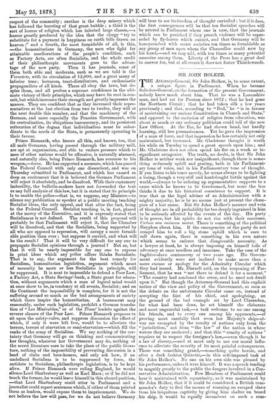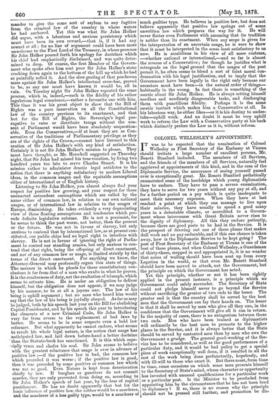SIR JOHN HOLKER.
THE Attorney-General, Sir John Holker, is, to some extent, a unique figure in Parliament. When he became Solicitor-General, on the formation of the present Government, nobody knew much about him. That he was a Lancashire man, and had sat for Preston since 1872 ; that he had gone the Northern Circuit ; that he had taken silk a few years previously ; and that, according to " Dod," he " is in favour of maintaining our ancient Constitution in Church and State," and opposed to the exclusion of religion from education, was about as much as any ordinary politician could tell of the new Law Officer. At the Bar, he had shown head, but hardly learning, still less persuasiveness. Yet he gave the impression of a man of force, and that impression he has certainly not only maintained, but increased. Mr. Gladstone thought it worth his while on Tuesday to spend a great speech upon him ; and Mr. Gladstone does not often spend his fire on a weak or in- significant antagonist. The truth, no doubt, is that Sir John Holker is neither weak nor insignificant, though there is some- thing arduously uphill and grating, both in his Parliament- ary tone of voice, and in his Parliamentary tone of thought. If you listen to his tones merely, he seems always to be fighting a losing, though a very stiff and hard-fought battle against the world,---always to be ordering up argumentative supports to a cause which he knows to be foredoomed, but none the less thinks it due to his historical conscience to support. It is true that as the legal adviser of an Administration with a mighty majority, he is by no means just at present the cham- pion of a lost cause. But Sir John Miller's manner and vein of thought are in all probability far too deeply ingrained in him to be seriously affected by the events of the day. His party is in power, but his spirits do not rise with their successes. Ccelum non animum mutat. There is something of the political Sisyphus about him. If the emergencies of the party do not compel him to roll a big stone uphill which is sure to roll down again, there is something in his own nature which seems to enforce that disagreeable necessity. As a lawyer at least, he is always imposing on himself toils of advocacy at once needless and immense. Take the case of the fugitive-slave controversy of two years ago. His Govern- ment evidently were not inclined to make more than a mere excuse or apology for the Admiralty Circular which they had issued. Mr. Disraeli said, on the reopening of Par- liament, that he was " not there to defend it for a moment." "The country had condoned the error, and he need not dwell upon it." But though the Attorney-General had this explicit notice of the view and policy of the Government, so soon as the debate on the unfortunate Circular came on, instead of accepting the hint of his chief, and apologising, on the ground of the bad example set by Lord Clarendon, for what had been done, he set himself the elaborate and most ungrateful task,—a task welcome to no one among his friends, and to every one among his opponents,—of proving most carefully that even her Majesty's ships-of- war are exempted by the comity of nations only from the " jurisdiction," not from " the law " of the nation in whose waters they, are anchored ; and that this " comity of nations " requires us to respect the foreigner's law,—even though it be a law of slavery,—and at most only to use our moral influ- ence to alleviate the severity of its most painful consequences. There was something grand,—something quite heroic, and after a dark fashion Quixotic,—in this self-imposed task of Sir John Holker's. No one on his own side was pleased by his performance, unless it were himself. It was a speech tending to magnify greatly to the public the dangers involved in a Con- servative Administration. Few Members of Parliament could hear it maintained with equanimity, as it was maintained by Sir John Holker, that if it could be considered a British com- mander's duty to find the means of rescuing an escaped slave from his iniquitous captivity by giving him shelter on board his ship, it would be equally incumbent on such a com- mender to give the same sort of asylum to any fugitive from the criminal law of the country in whose waters he had anchored. Yet this was what Sir John Holker did argue, with a laborious and anxious persistency which must have been its own reward,—that is, if it had any reward at all ; for no line of argument could have been more unwelcome to the First Lord of the Treasury, in whose presence Sir John Holker poured forth his apology for doctrines which his chief had emphatically disclaimed, and was quite deter- mined to drop. Of course, the first Member of the Govern- ment who spoke after him sent poor Sir John Holker's stone crashing down again to the bottom of the hill up which he had so painfully rolled it. And the slow grating of that ponderous mass against Sir John Holker's intellectual crow-bar, proved to be, as any one must have known it would be, all in vain. On Tuesday night Sir John Holker repeated the same process, which is, indeed,—such is the fidelity of his rather lugubrious legal conscience,—rather a favourite one with him. This time it was his great object to show that the Bill of Rights was a pure innovation on all the Constitutional law of the country previous to its enactment, and that but for the Bill of Rights, the Sovereign's legal pre- rogative to raise or distribute troops without the con- sent of Parliament would have been absolutely unquestion- able. Even the Conservatives,—if at least they are as Con- servative of the traditions of Parliamentary privilege as they are of the rights of the Crown,—cannot have listened to this oration of Sir John Holker's with any kind of satisfaction. Certainly it is not Sir John Holker's mission to please. They must have thought, as Mr. Herschell suggested on Thursday night, that Sir John had missed his true vocation, by living two hundred years too late to serve Charles Stuart. It is his mission rather to administer drastic legal antidotes to the notion that there is anything satisfactory to modern Liberal ideas, in the common usages and the equitable assumptions either of international or of English history.
Listening to Sir John Holker, you almost always find your respect for positive law growing, and your respect for those unenacted antecedent assumptions which are called by the name either of common law, in relation to our own national usages, or of international faw in relation to the usages of Europe, diminishing. He takes evidently a very depreciating view of those floating assumptions and tendencies which pre- cede definite legislative reforms. He is not a pessimist, for he seems to think the past worse, not better, than the present or the future. He was not in favour of slavery, but only anxious to contend that by international law, as at present con- stituted, our public ships had no legal right to interfere with slavery. He is not in favour of ignoring the right of Parlia- ment to control our standing armies, but only anxious to con- tend that that right, being the offspring of direct enactment, and not of any common law or usage, is limited strictly by the terms of the direct enactment. For anything we know, the Attorney-General may profoundly regret this state of things.
The manner in which he pleads for these unsatisfactory con- clusions is far from that of a man who exults in what he proves. It is the sombreness of duty, not the exultation of triumph, which seems to actuate him. He is under an obligation to deliver himself, but the obligation does not appear, if we may judge by his manner, to be at all a joyous one. The law of his being is uphill argument ; but no man who heard him would say that the law of his being is joyfully obeyed. As far as may be judged, both by his speech last year on the Bill for abolishing Capital Punishment, and by his speech this year in introducing the elements of a new Criminal Code, Sir John Holker is very far from averse to the replacement of bad laws by better. He seems to be in some respects even a bold law reformer. But what apparently he cannot endure, what seems to revolt his whole legal nature, is the notion that usage has anticipated law, and laid down before-hand a better doctrine than the Statute-book has sanctioned. It is this which espe- v.ially vexes and chafes his soul. Sir John seems to believe with the greatest reluctance that usage is ever in advance of positive law ;—if the positive law is bad, the common law which preceded it was worse ; if the positive law is good, then it was preceded by some positive or common law which was not so good. Even Nature is kept from deterioration chiefly by law. If burglars or garotters do not commit murder, they are only prevented from doing so, according to Sir John Holker's speech of last year, by the fear of capital punishment. He has no doubt apparently that but for the tonic influence of positive law, the robber would be a murderer, and the murderer of a less guilty type, would be a murderer of much guiltier type. He believes in positive law, but does not believe apparently that positive law springs out of some unwritten law which prepares the way for it. He will never flatter even Parliament with assuming that its tradition is nobler than its enactment. When any scope is given for the interpretation of an uncertain usage, he is sure to show that it must be interpreted in the sense least satisfactory to us now. He is atrabilious in his view of all mere customs, —whether national or international,—and so far is almost the reverse of a Conservative ; for though he justifies what is retrograde on the legal ground that the usages of the past permit it, he often seems to blend a sort of faint moral con- demnation with his legal justification, and to imply that the Government have been legally in the right only because our ancestors must have been—in the natural order of things— habitually in the wrong. In fact there is something of the ascetic about Sir John Holker. He is always setting himself needless and needlessly disagreeable tasks, and discharging them with punctilious fidelity. Perhaps it is the same ascetic instinct which makes him a Conservative at all. In his laborious way, he either likes—or it is his destiny to under- take—uphill work. And no doubt it must be very uphill work to reform the Law with a Conservative party at his back which distinctly prefers the Law as it is, without reform.



































 Previous page
Previous page